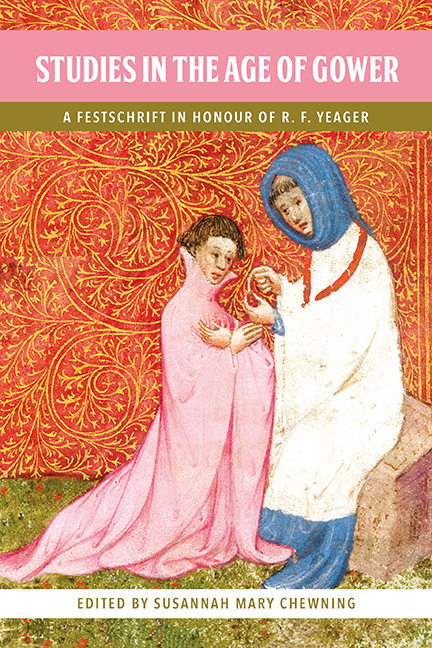Book contents
- Frontmatter
- Contents
- List of Illustrations
- Notes on Contributors
- Acknowledgements
- List of Abbreviations
- Introduction
- Part I Text
- Part II Gender
- Part III Time
- Part IV Spirit
- Part V Intersections
- A Personal Tribute to R.F. Yeager
- Bibliography of R.F. Yeager’s Writings
- General Bibliography
- Index
- Miscellaneous Endmatter
Introduction
Published online by Cambridge University Press: 28 April 2020
- Frontmatter
- Contents
- List of Illustrations
- Notes on Contributors
- Acknowledgements
- List of Abbreviations
- Introduction
- Part I Text
- Part II Gender
- Part III Time
- Part IV Spirit
- Part V Intersections
- A Personal Tribute to R.F. Yeager
- Bibliography of R.F. Yeager’s Writings
- General Bibliography
- Index
- Miscellaneous Endmatter
Summary
YEAGER'S FIRST PUBLICATIONS FOCUSED on Gower, and he has been devoted to Gower studies for his entire career. He helped to create and has served as President of the Gower Society since the early 1980s. It is not surprising that someone would devote his career largely to one figure, or that this devotion would develop into and create a scholarly topic for himself and generations of scholars to follow. I think, though, that Yeager's choice of Gower is telling. “John Gower (d. 1408) was, during his lifetime and into the Enlightenment, considered the father of English poetry … Gower invariably – and deservedly – appears alongside Chaucer in early laudatory accounts of the birth of English letters.” Gower is always, for modern readers, compared to Chaucer and, of course, in terms of his fame and influence, comes in second to Chaucer for most medievalists. His influence is great, but to the wider public he is virtually unknown. R.F. Yeager's research subject, starting in the 1970s, was not to take the more-travelled road of Chaucer studies but to focus on the until then less well-known, even less-translated and studied, John Gower, whose influence on later writers such as John Milton and Ben Jonson notwithstanding was nearly forgotten after the eighteenth century.
R.F. Yeager's influence on Gower studies cannot be understated: as Derek Pearsall says in his essay in this collection, “Bob Yeager … has ever been the friend of Gower studies, and without [him] Gower would still be a shadow at Chaucer's feast.” Yeager's publication history is a testimony to the growth of Gower studies in the years since he began his own work. The Bibliography of R.F. Yeager's Writings included in the endmatter of this volume (see pp. 229–36) shows the progress of the study of John Gower and Yeager's impact on it since the 1980s. In addition, Bob has been exceedingly generous to younger scholars of Medieval Studies and, especially, of Gower studies. A shared desire to pay warm tribute is at the heart of this collection. In it are essays written by authors with a variety of backgrounds and experience: Gower scholars who have been influenced by or been an influence upon R.F. Yeager's own work.
- Type
- Chapter
- Information
- Studies in the Age of GowerA Festschrift in Honour of Robert F. Yeager, pp. 1 - 8Publisher: Boydell & BrewerPrint publication year: 2020



